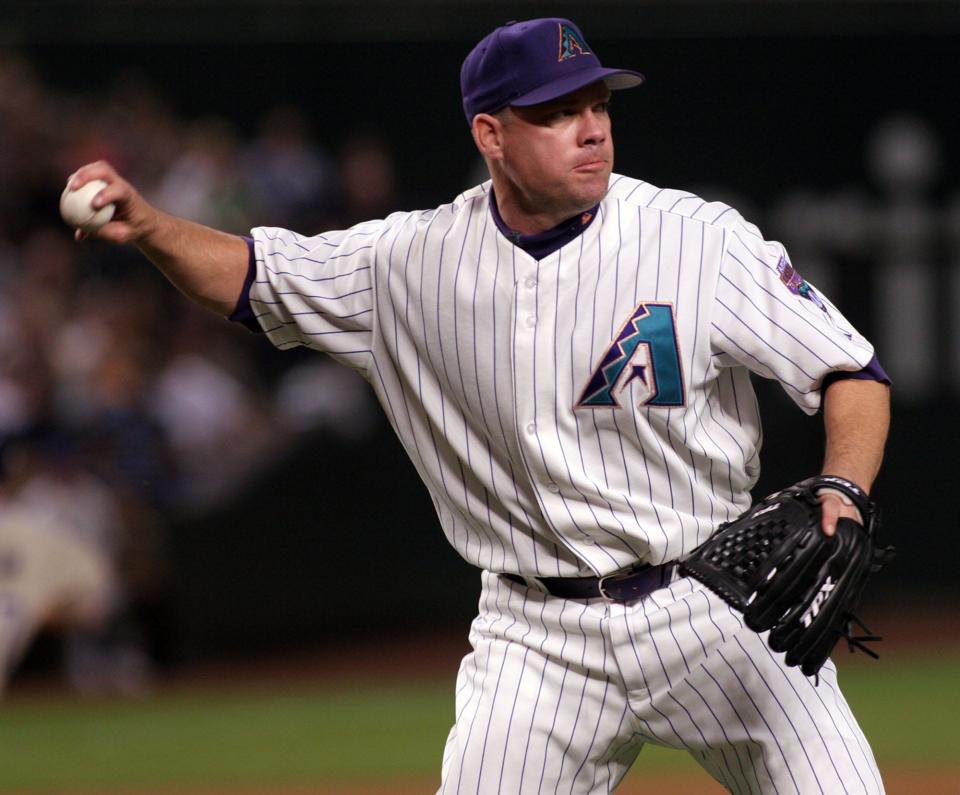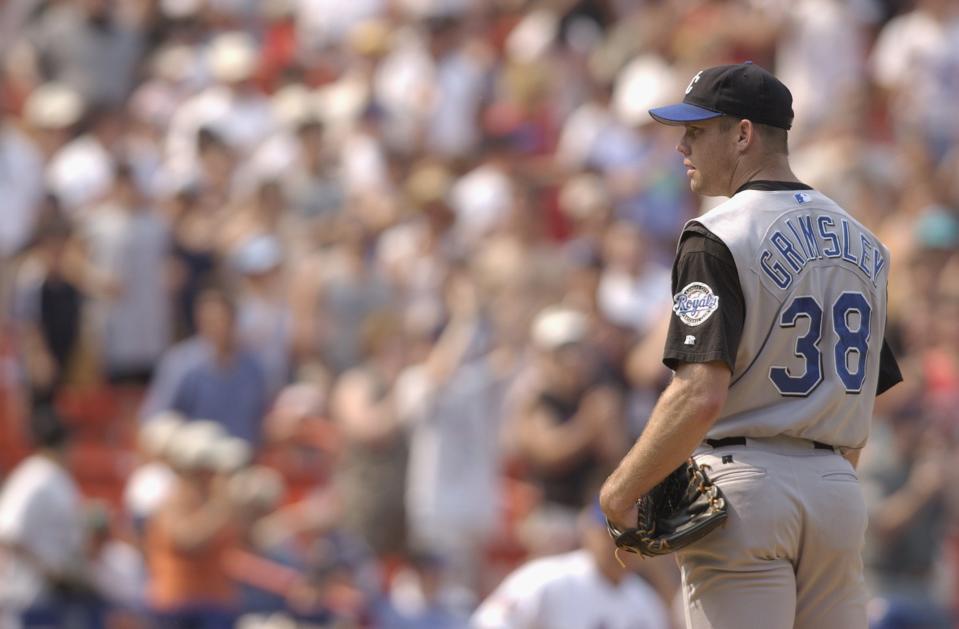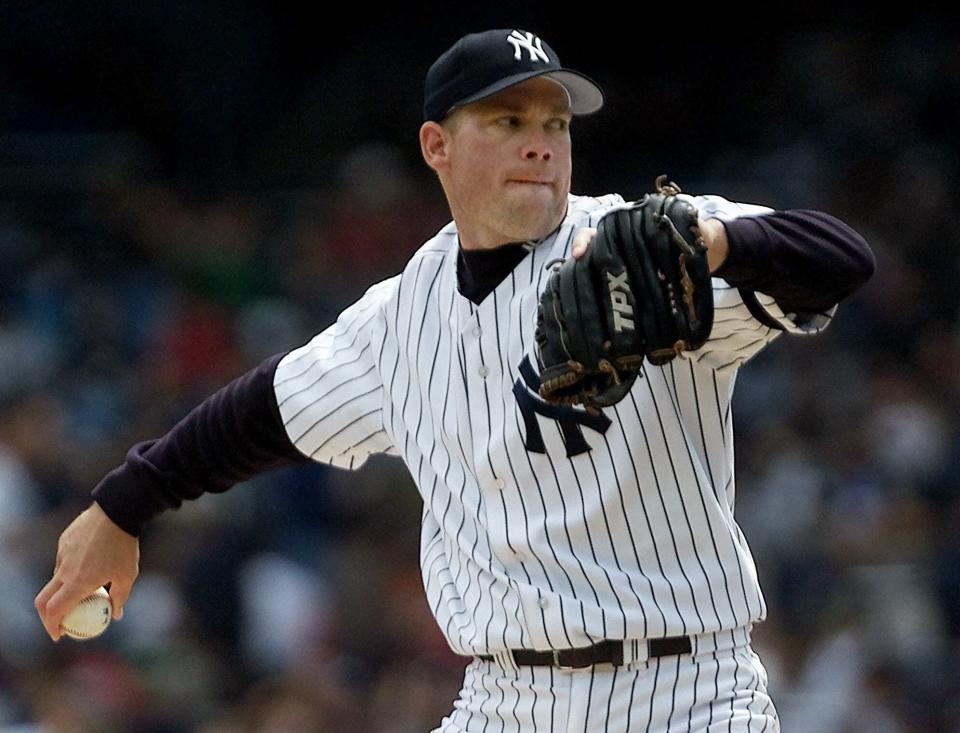Former MLB pitcher Jason Grimsley details bleak bout with addiction, profound recovery in new book
- Oops!Something went wrong.Please try again later.
If you or someone you know is experiencing a mental health crisis, call the 988 Suicide and Crisis Lifeline which provides confidential 24/7 support by dialing 9-8-8.
SCOTTSDALE, Ariz. — Three FBI agents drove up to the 5,100-square foot rental home in this quiet suburban neighborhood of Scottsdale and asked for Arizona Diamondbacks pitcher Jason Grimsley to come to the front door.
It was the morning of April 19, 2006.
It was the day Grimsley’s 15-year Major League Baseball career effectively ended. Grimsley received two kits of human growth hormone that he ordered, paying $3,200. He was questioned for two hours and admitted in a sworn affidavit that he had been using performance-enhancing drugs for about half of his career.
Nearly 10 years later, Grimsley underwent another life-changing event.
It was the afternoon of Aug. 21, 2015. This one didn’t make the news.
It was the day Grimsley tried to kill himself.
Grimsley, high on an ounce of cocaine, six bottles of vodka and a few cans of beer, cocked his pistol, put the barrel next to his left eye, and pulled the trigger, waiting for the bullet to finish his life.
"I was waiting, but nothing happened," Grimsley told USA TODAY Sports. "I guess I didn’t take off the safety feature.
"I didn't have the (guts) to do it again. I just remember thinking, 'I can’t even do that right.'"
NEWSLETTER: Sign up now and get Sports headlines delivered daily
MLB FREE AGENCY: Ranking MLB's top 87 free agents, from Aaron Judge to Corey Dickerson
Grimsley, 55, talks about his life, his drug and alcohol rehabs, the psych wards, his performance-enhancing drug use, and his journey toward redemption in his book, "Cross Stitched: One Man"s Journey from Ruin to Restoration."
All proceeds from the book will be donated to Emerging Grace Ministries, a non-profit organization trying to end adolescent sex trafficking.
Grimsley, who lives outside Houston, began telling his story to small church groups several years ago. He was persuaded by his wife, Dana, clergymen and friends that he needed to make his story public. They convinced him he could save and impact lives by reaching a national audience, letting them know they are not alone in their struggles, and if he can make it, so can they.
"I told Dana, 'I don't want to be in the papers. I don't want to be in the limelight. I'm just a redneck from East Texas,'" Grimsley said. "I had such a bad taste of life from a personal standpoint, I did not want to relive any of it. I just wanted to push it back and bury it. I didn't want it to be about me. I didn't see any purpose.
"But now that I look back, I want to point to the Lord and his grace and his salvation. There's no reason I should be alive today. I should have died.
"Now I know why I'm here."
Grimsley, who pitched for seven teams over 15 years, appeared in 552 games, and won back-to-back World Series championships (1999-2000) with the New York Yankees, spoke with USA TODAY Sports for nearly 1½ hours.
He’s proud of his major league career, which lasted longer than he ever could have imagined, but it’s such an inconsequential part of his life now when for so many years it was his entire life.
Grimsley did everything he possibly could do to survive in the game, taking human growth hormones, steroids, amphetamines – anything he could find to give him an edge.
Unlike thousands of others in the game who were believed to be doing the same thing, he was one of the few who were caught.
"There were a lot of things I regret in my life," Grimsley says quietly, "but (PEDs) wasn’t one of them. Would I change anything? Other than (not) hurt those close to me, not a thing. I don't have any ill will for what I did. It was part of my story. It's a lot of guys' stories. It is what it is.
"At the end of day, nobody gave a (expletive) what I put in my body."

Grimsley spoke to federal agents without an attorney for two hours that April day in 2006, and for the next two months the feds kept asking him for names. They wanted the names of players. They wanted trainers. They wanted dealers. And they really wanted Barry Bonds.
The federal agents even asked Grimsley to wear a wire and speak to Bonds, who was ensnared in the BALCO investigation, to try to get him to confess to steroid use. Grimsley refused. His affidavit was unsealed in which he revealed names of players who he suspected might be using, but had no proof.
His home was raided by 13 FBI agents for six hours on June 7, 2006. He requested and was granted his release a day later by the D-backs. His career was over.
"I didn't know Jason was using, but was I surprised when he got hit with it? No, I was not," said former Kansas City Royals teammate Jeremy Affeldt. “You had strong suspicions on guys, a lot because it was so freakin' obvious. But it wasn't like guys were sitting in front of their lockers doing stuff. It wasn't like that.
"It wasn't just bad guys, it could have been anybody that had the feds knock their doors down. It's not something you want to happen to you, but you had to live with it.
"In some ways, he thought it might have taken his life. But it might have saved his life."
Grimsley and his family moved back to Kansas City for three years. He purchased a couple of buildings, opened a baseball facility, and then moved permanently to Hockley, Texas (population, 21,537) in 2009. He invested in his cousin's pharmaceutical company, along with a commercial waste technology company and became a part-time hunting guide, but his life slowly spiraled out of control. It was alcohol. Then cocaine. Then meth. And then everything he could get his hands on.

"He always dealt with two people, an angel on one shoulder and a demon on the other," Affeldt said. “Baseball was good for him in many ways, but also bad in many ways. When you saw him out of uniform, he was happy, full of life. When he was in uniform, it was a battle. He had to go to a different place to compete."
Grimsley discovered he was unable to cope with life without baseball, and his life quietly unraveled. He managed to hide his addiction nearly for years, really, even from himself.
"I was taking anything I could get my hands on," he said. "I just wanted to be numb. I didn't want to think what kind of person I was, or what I was doing to myself and my family. I was constantly hiding it."
His marriage deteriorated. He stopped being around his three children. He abandoned his friends. And then came that afternoon in August 2015 when he decided to end the pain.
He drove to his cousins' property, wrote letters to family members, called friends, left voicemails, thanking them for their love, and apologizing for letting them down.
The chilling voicemail to Affeldt: "Hey man, I love you. I've always loved you. Always. I'm just tired of hurting people. I've had enough. I just don't want to do this anymore."
Affeldt, who missed Grimsley's call and didn't play the voicemail until hours later, couldn't believe what he was hearing.
"I was like, 'What? Whoa!'" Affeldt said. "It was so dramatic and traumatic. It was such a random voicemail, a tone in his voice that I wasn't used to hearing. Jason would never give up, at any time, any pitch, in any game. He never backed down from anything.
"It was the first time I ever heard a tone of surrender, not in a humbling moment, but a give-up tone. He was giving up everything. He was understanding the pain people have felt through his decisions, and instead of wanting to face that, he wanted to end it.
"I think he died emotionally. He almost died physically."

Grimsley was found six hours later after the suicide attempt, walking aimlessly through the woods, almost in shock. He received immediate help with his anxiety, depression and addiction. His family told him how much they love him, and his friends kept reminding him of the impact he made on their lives.
Joe Bick, his baseball agent since 1986, talked about Grimsley’s fierce loyalty and being there for the entire family after Bick’s son, Ryan, died of a heroin overdose in January 2015.
"Jason is among the group of guys that I hope will eventually carry me to my grave," Bick says. "He is a very special individual in my life. The relationship has run from me yelling and screaming at him to crying for him."
Grimsley’s kids, now 28, 26 and 22 years old, told him how much he meant in their lives, and Dana vowed she would never leave him.
He also found faith, putting his life and vision into God’s hands, believing there had to be a plan.
"Those demons, they don't discriminate," Grimsley says. "It's all the same pattern. It's the same road, oftentimes the expressway, that everybody is on.
"Race horses, when they can't race, they put a bullet in them. It's like you're useless. That's the way I felt. I failed and hurt so many people."
Devoting one's entire life to the game, and for it to suddenly be gone, can be ruthless to the soul. The pain, too often, is easily soothed by drugs and alcohol.
The vices can not only ruin your life, but also all of those around you.
"The only thing worse than Ryan dying," Bick says of his late son, "was Ryan being addicted. I don't think any of us understood the gravity of Jason's situation. But you see how his life has changed like it has. It's one of the most awesome things I've seen happen in my life. He has done a complete 180 in terms of opening up about himself."
Affeldt talks about Grimsley being by his side when he went through a painful divorce two years ago. He spent five days with Affeldt to make sure he'd be OK with his 22-year marriage ending. And there was Grimsley, once again, at Affeldt’s side, a few weeks ago when he got remarried.
"A lot of people can impact people's lives if they can just be vulnerable," Affeldt says. "But a lot of people are not willing to be transparent and letting people in. I've seen people that have just cracked when they left the game.
"Jason can relate to so many people and give people hope."
And Grimsley has a powerful story to tell.
"I thought my purpose in life was to play baseball," Grimsley says. "Now, I realize that wasn't it. My purpose is right here, right now. No doubt this was God's plan all along.
"I want people to get a glimpse of the things I lived through. My success. My failures. Why they were my failures. Why I believe I got through my failures.
"All I truly want to do is help."
Follow Nightengale on Twitter at @Bnightengale.
This article originally appeared on USA TODAY: Ex-MLB pitcher Jason Grimsley attempted suicide, fought addiction

